04. Poetry Corner: Afternoon on a Hill, Edna St. Vincent Millay
Come and take a walk to a hilltop and enjoy the view!
Afternoon On A Hill
I will be the gladdest thing Under the sun! I will touch a hundred flowers And not pick one.
I will look at cliffs and clouds With quiet eyes, Watch the wind bow down the grass, And the grass rise.
And when lights begin to show Up from the town, I will mark which must be mine, And then start down!
Edna St. Vincent Millay
Personal Reflections
After reading this poem, I feel as if I have taken a walk outside, and felt the peace of the world on a warm afternoon. I feel content, at ease and earthbound.
For me, it this poem is an invitation to step outside, look out at the world around me, connect with nature, and feel gratitude for that little ‘light’ that’s mine.
Structure
The poem has three stanzas of four lines, called quatrains, and follows a rhyming scheme of ABCB. Each rhyming line has four syllables, and non-rhyming lines have seven, which gives the poem a jaunty yet soft rhythm, which reminds me of a person walking and stopping every now and then to look at the scenery.
Themes
The poem explores a connection between a person and nature, and how a person can experience joy in solitude out in nature.
Imagery
The poet uses imagery of natural elements, capturing it most vividly in the lines “Watch the wind bow down the grass, / And the grass rise.” The movement brings the scene to life, and we can see the grass bending, and the wind sweeping across the vista.
She tells us of “a hundred flowers”, yet she doesn’t “pick one”, showing that she has found that she can appreciate the flowers, i.e. nature, without having to take it for herself.
Summary
This poem is calming, and brings me into a meditative state. I find that it urges me to “look at the cliffs and clouds / With quiet eyes.”
Edna St. Vincent Millay (born February 22, 1892, Rockland, Maine, US. Died October 19, 1950, Austerlitz, New York, US).
Edna St. Vincent Millay, or Vincent, as she was known throughout her childhood, was born poor in Maine, the eldest of three daughters. Her mother, Cora, was a travelling nurse with an artistic streak. Her parents divorced in 1901. For a few years, her family moved around New England before finally settling in Camden, Maine, where they rented a small house in a ‘bad’ section of town. Her mother would leave home for weeks at a time, while Vincent ran the household and cared for her sisters.
After Vincent graduated from high school at nineteen, she entered a dreary adult life. She was working twelve-hour days at home, cleaning, cooking, washing, and ironing. It was under these conditions that Millay began to compose her poem “Renascence,” which would change her life. She recited “Renascence” at a party, and one of the guests, impressed by her performance, offered to connect her with friends who could pay her way through Vassar, a college in Poughkeepsie. Millay enrolled in the fall of 1913, and threw herself into the mix, attending parties, starring in plays, and dating several of her wealthier classmates. (Vassar was all female, and romances between young women were common at the time.)
After graduation, she moved to New York with her sister Norma, in a small, cold apartment on West Ninth Street; the pipes froze, as did the flowers Millay brought home to beautify the space. She was acting and writing poems, but the sisters often relied on male suitors to buy their dinners.
During the nineteen-tens and twenties, she began to achieve the kind of fame that was unusual for a poet and more like that of a celebrity. Her books of poems sold out their print runs. She wrote feverishly, working on short stories, plays, a libretto, a novel. She was photographed and interviewed; she was invited to lecture; she won the Pulitzer Prize and became rich.
She married the Dutch aristocrat and merchant Eugen Jan Boissevain, in a small ceremony in 1923. Her marriage was open, as were the marriages of many of their friends, but, from her diaries, it appeared that they loved spending time at the farm they owned near Austerlitz, New York.
Towards the end of her life, she and husband were in debt, and her stardom had rescinded. She died at fifty-eight, of a heart attack, after falling down the stairs in her home.
She achieved unprecedented renown as a poet, and to this day her poems carry poignant, reflective and uplifting messages, bound in their ageless themes of love, death, and nature.
Thank you for reading!






